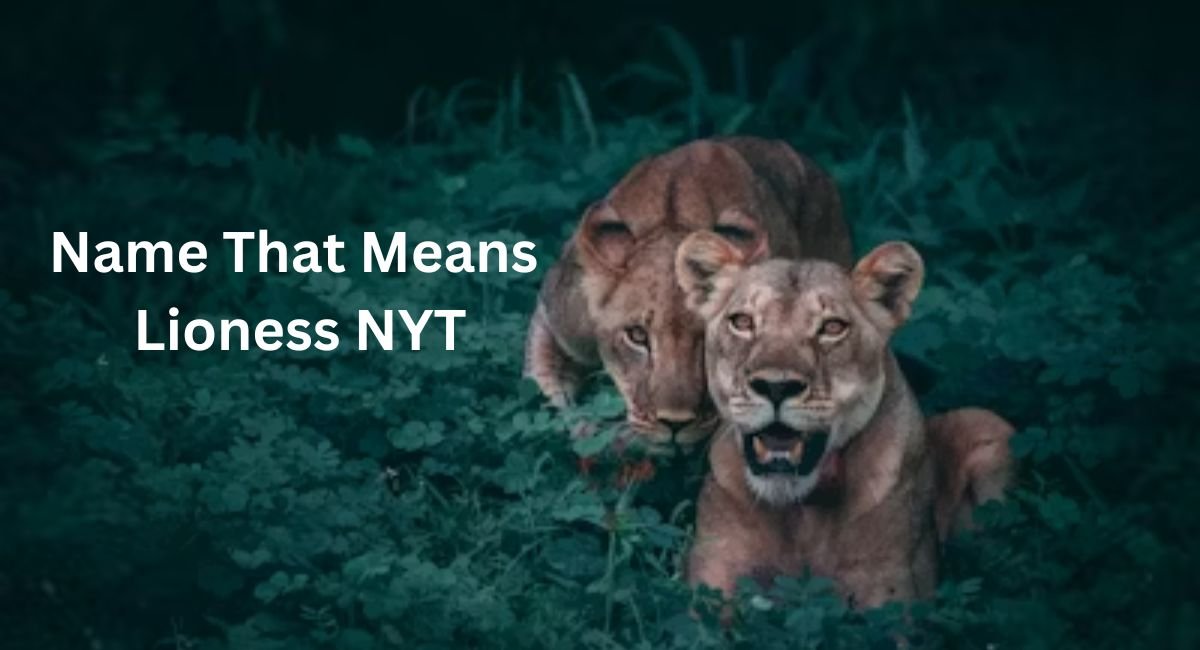Names carry profound meaning, often embodying qualities, virtues, or symbolic representations from the natural world. A “Name That Means Lioness NYT” conveys power, grace, and fierce protection, resonating deeply across various cultures and languages. Recently, the New York Times highlighted this trend, shedding light on the growing popularity and cultural significance of such names. But what exactly does it mean to bear a name that embodies the essence of a lioness, and why has it captured the imagination of so many?
The Cultural Significance of Lioness-Inspired Names
Throughout history, the lioness has been revered as a symbol of strength, courage, and maternal protection. In various cultures, the lioness is not just a fierce predator but also a nurturer, embodying both power and gentleness. This duality makes lioness-inspired names particularly appealing, especially in a modern context where women are celebrated for their strength and independence.
In African cultures, the lioness is often seen as a guardian of the tribe, a role that translates into names that evoke leadership and resilience. In Western cultures, the popularity of names such as “Nala,” popularized by Disney’s The Lion King, has only grown, reflecting an admiration for the lioness’s symbolic attributes.
Exploring the Meaning Behind the Name “Nala”
One of the most iconic names that means “lioness” is “Nala,” a name that gained widespread recognition through the beloved character in The Lion King. Derived from various African languages, including Swahili, “Nala” means “successful” or “gift.” However, it is the association with the lioness character that has truly made this name resonate with many parents looking for a name that symbolizes strength and grace.
The New York Times recently discussed the trend of choosing names with powerful animal associations, particularly those linked to the lioness. The article explored how names like “Nala” have become increasingly popular as more parents seek names that not only sound beautiful but also carry a sense of empowerment.
Other Names That Mean Lioness
While “Nala” may be the most famous, there are several other names across different cultures that also mean “lioness” or have similar connotations. Here are a few examples:
Leona: Of Latin origin, “Leona” literally means “lioness.” It is a strong and elegant name that has been used across various cultures.
Ariella: Derived from Hebrew, “Ariella” means “lioness of God.” This name blends the fierce imagery of the lioness with a spiritual dimension, making it a unique and meaningful choice.
Lenya: A name of Russian origin, “Lenya” means “lioness” and is a less common but equally powerful option.
Zara: In Arabic, “Zara” can mean “flower,” but in Hebrew, it is associated with the lioness, giving it a strong yet feminine appeal.
The Rise in Popularity of Animal-Inspired Names
The New York Times article delved into why names with animal meanings, particularly those symbolizing strong animals like the lioness, are becoming more popular. In a world where gender norms are continually evolving, names that embody strength, independence, and resilience are increasingly sought after by parents. The lioness, with her ability to protect and nurture, provides a perfect metaphor for these qualities.
Moreover, the association of these names with beloved cultural references, such as The Lion King, further boosts their appeal. Names like “Nala” carry a legacy that extends beyond their literal meanings, embodying the spirit of a character who is both a leader and a protector.
Why the Name That Means Lioness Resonates Today
In today’s society, where names are often chosen to reflect individuality, cultural heritage, and personal values, a name that means “lioness” offers a powerful connection to these ideals. Whether it’s for a child, a character, or even a business, names inspired by the lioness convey a sense of dignity, power, and care.
The New York Times highlighted this trend as part of a broader discussion on how names influence identity. The article emphasized how the symbolism of a name can affect not only how others perceive us but also how we view ourselves. For instance, a name like “Nala” may inspire confidence and pride, qualities that are deeply rooted in the character and symbolism of the lioness.
FAQs
What are some popular names that mean lioness?
Some popular names that mean lioness include Nala, Leona, Ariella, and Lenya.
Why are lioness-inspired names gaining popularity?
Lioness-inspired names are gaining popularity because they symbolize strength, courage, and independence, qualities that resonate with many modern parents.
Is “Nala” a common name?
Yes, “Nala” has become a common name, especially after the success of Disney’s The Lion King, where the lioness character Nala played a significant role.
What does the name “Leona” mean?
“Leona” is of Latin origin and directly translates to “lioness,” symbolizing strength and majesty.
Are there any Hebrew names that mean lioness?
Yes, “Ariella” is a Hebrew name that means “lioness of God,” combining both strength and spirituality.
Can a name really influence identity?
Yes, as discussed in the New York Times article, names can influence both self-perception and how others perceive us. Names with powerful meanings, like those associated with a lioness, can inspire confidence and strength.
Conclusion
Names hold the power to shape our identities and reflect our values. A “Name That Means Lioness NYT” is more than just a nod to a majestic animal; it’s a statement of strength, protection, and grace. The New York Times has recognized this growing trend, showcasing how such names resonate in a world where empowerment and independence are increasingly celebrated. Whether you are drawn to the cultural richness, the symbolic power, or the beauty of the name, choosing a lioness-inspired name connects you to a legacy of strength that transcends generations.



